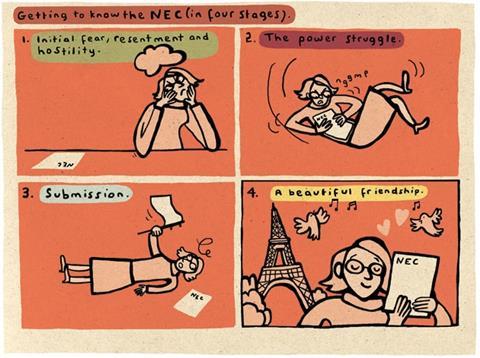Some contractors are upset that their old friend ICE conditions of contract has been dumped. But once they get to know the NEC, they’ll have their new buddy on speed dial
The ICE conditions of contract has been given its cards. At a discreet little ceremony at the Institution of Civil Engineers in London, the 65-year-old engineers’ friend was led in, given a big Brunel clock, then ushered out for good. The whippersnapper taking its place is that ambitious go-getter the NEC3.
The other day I told an audience of contractors how much I loved and admired the NEC. Their response was a cry of derision. These folks didn’t believe me. But there is a trick to be played with the NEC; you have to work long and hard, use considerable patience and one day it all falls into place.
The rub is that it’s not a contract that you stick in the bottom drawer. Rather, it is a working contractual manual. So as well as being up to your engineering neck in mud, muck and sheepsfoot rollers, you are up to your ears in rules, risk registers, defined costs, core clauses and x-factors. The damn thing works if you work on it, read it, struggle with it. And if you are an ICE 5th edition or 6th edition man, and it was an old friend, that’s part of the battle. Let it go.
In the formal bumf from the ICE, it says the move comes from “a desire to promote what we see as a more collaborative approach to contract management”. Hmm. Does that give a hint that there has been a row or two about dumping the ICE? The Association for Consulting and Engineering (ACE) was consulted and it emphasises that it was part of the joint decision and will work closely with the ICE to make sure there is a smooth transition.
The Civil Engineering Contractors Association (CECA) sounds cooler: “CECA understands the ICE’s position in relation to the ICE suite of contracts. We are, however, aware of the significant use that is still made of ICE conditions for civil engineering and associated work … Together with ACE we are committed to ensuring continued choice and will take the opportunity to ensure that this remains, and provide contracts relevant to the needs of clients and others within the industry.” Now then, if I were having a bad hair day, I would take those remarks by the CECA to be getting close to telling the ICE to go to blazes.

Those civil engineering contractors who were weaned on ICE 5th and 6th are being nudged into new territory - and it’s a blow. It is exactly the same problem as nudging the building contractors out of their JCT comfort zone into, say, NEC or PP2000. It comes hard. If you have carried out umpteen projects over many years on ICE contract documents, you are on autopilot.
The mood, however, is to manage the contract documentation with as much emphasis as doing the work itself. Many a problem project comes about because the paperwork goes awry. Users of the NEC know that that’s not the way to construct. Every single NEC contract is identical to every ICE and JCT and PPC and GC Works and whatever documents you dream up; identical in the sense that every job from day one undergoes changes of mind. The customer always introduces a change of requirements. The NEC has a trick of jumping on any changes today, now, immediately. The change is jumped on straight away, and argued about in terms of time and money. And lo, if the contractor and project manager can’t see eye to eye immediately, the adjudicator quickly turns up and cracks the dispute before it becomes open warfare.
So ICE folk, you are now lumbered with the NEC. Like it or lump it. The cost of running an NEC contract can be calculated. There must be a full-time project manager on site all day, every day and paid for by the employer. That manager has the contract on their desk, in their hand, in their head. The contractor must have a full-time NEC document manager, too.
Those two people do nothing else but manage the rules, notices, compensation events and more. So the costs are plain. The costs of managing the subcontractors are identical. No subcontractor can be engaged unless it prices for managing the form. Expensive? Yes. Realistic? Yes.
All that this contract needs is to be actually used to run the job. Apply the rules, meet a difference of opinion and call the referee. It’s easy. Honest.
Tony Bingham is a barrister and arbitrator at 3 Paper Buildings Temple

























No comments yet